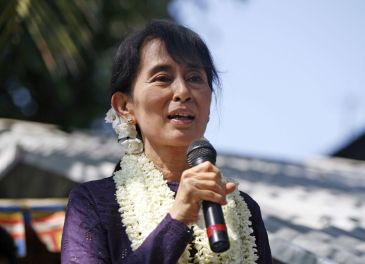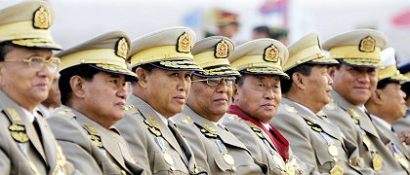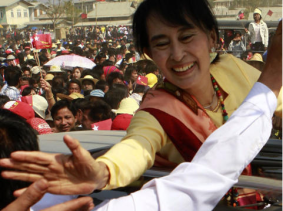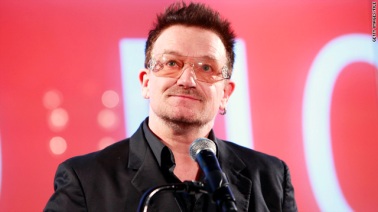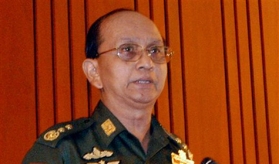Building castles in the skies over Burma
April 4, 2012 1 Comment
Ayushman Jamwal
After more than two decades of being under house arrest, Burmese opposition leader and global democracy champion, Aung San Suu Kyi was allowed to contest the by-elections held on Sunday. Her party, the National League for Democracy (NLD) was contesting 40 of the 45 seats up for elections.
The citizens of Myanmar have lived under the iron fist of the Burmese military for more than five decades with strict policies of censorship, and severe crackdowns and imprisonment of anti-government activists. Through its political wing, the United Solidarity and Development Party (USDP), the military rewrote the constitution endowing itself with electoral authority, guaranteeing its personnel important government positions and 25% seats in the Parliament. The nation’s citizens have yearned for Suu Kyi to re-enter politics after the military rejected her electoral victory in 1990. In 2010, the NLD boycotted the elections after the military announced rules requiring the party to expel Suu Kyi because they argued she had a criminal record for opposing the state. After the reformist, retired general Thein Sein came to power in March last year, Suu Kyi was released from house arrest.
On Monday, state television in Myanmar announced that the National League for Democracy won all of the 40 seats it contested, while Suu Kyi reportedly gained 99% of the votes in her constituency of Kawhmu – a string of villages comprising of 85,000 voters. People across Burma were ecstatic about her long awaited victory, dancing in the streets, decked in NLD merchandise, holding placards and shouting slogans of support.
The media has been rife with statements, articles and opinions that ‘The Lady’, as she is known in Myanmar, has ushered in a ‘new era’ of democracy in her nation. The Telegraph newspaper in Britain went with the headline, “Landslide victory for Aung San Suu Kyi sets Burmese nerves on edge”; the Economic Times went, “Aung San Suu Kyi’s victory is a symbol of positive change”; CNN argued, “Suu Kyi win heralds new chapter for thawing Myanmar”; and Bloomberg stated, “Suu Kyi’s Party Declares Landslide as Myanmar Opens Up”. ZEE News in Indiawent to the extent of stating that the NLD dealt “a crushing blow to a ruling party created by the former military junta”.
I can understand the reaction of the people. After five decades of autocratic governance and numerous human rights violations, their courageous and beloved leader has now entered Parliament after years of perseverance. However, the media’s reaction is far from the realities on the ground in Myanmar. The sensationalisation of the election result seems to be a byproduct of Suu Kyi’s international reputation as a Nobel Laureate whose spirited cause has been aggressively promoted by Western think tanks, human rights organisations as well as notable celebrities like U2 front man Bono and action legend Sylvester Stallone.
Suu Kyi’s BY election victory is not going to deliver democracy to Myanmar anytime soon. While the NLD may have 40 seats, the Junta backed USDP still controls 80% of the 664 seats in Parliament. The media world portends that the by-election results are a glimpse of the sweeping victory Suu Kyi may achieve in the 2015 general elections. I do not doubt her popularity or that of the NLD, or even her abilities to lead Myanmar. But a pre-existing constitution geared to sustain military control is a huge obstacle. To even amend the constitution, the NLD needs to achieve a 75% majority in Parliament. They had those numbers in 1990, but the Constitution grants that the President and the Armed forces have the power to overrule electoral decisions, and they did exactly that.
In my opinion, the Burmese leadership understood that Suu Kyi’s entry into Parliament was not going to change the status quo. It allowed her to contest the elections in an attempt to appease the Western nations supporting her into easing sanctions and allowing the nation to benefit from its untapped natural resources and 60 million consumer market. At present, sanctions on Burma ban imports, restrict money transfers; curb aid money, freeze assets and target jewellery with gemstones originating from the country. After Suu Kyi’s victory, the European Union hinted towards easing sanctions. Bloomberg reported that the EU foreign affairs spokeswoman, Maja Kocijancic said at a daily news briefing,
“We urge the international community to consider lifting economic sanctions onMyanmarso that the people of Myanmar can enjoy better opportunities. We do expect the foreign ministers will recognize the changes and there will be a positive signal from the Council.”
International Burma campaigners have cautioned against such a move by foreign powers and are more realistic about Suu Kyi’s by-election victory. Post the election results, Dr. Myint Cho from Burma Campaign Australia came on ABC radio and said,
“We are really concerned that lifting sanctions too early because of her victory in the by-elections will delay and potentially damage political reform and national reconciliation processes. Many hundreds of political prisoners remain behind bar. Humanitarian situation is very bad in Burma and military hostilities against ethnic minorities continue unabated.
On the same show, Therrel Oung from the Australia Burma Council said Suu Kyi will have no alternative than to negotiate with the military to ease their authoritarian control and improve the standards of living in Myanmar. He said,
“At first she won’t have any power, but like Aung San Suu Kyi has said, once she gets into the parliament she will try and negotiate with the military-appointed parliamentarians. She will try and change a lot of things for the country, like trying to create work for the people, better education, better healthcare system and that kind of thing.”
Interestingly, the elections come around the same time as Thein Sein’s reformist government is pushing legislation through Parliament to provide investment incentives to businesses. These include, tax breaks of up to five years, the right to lease real estate from the state or private hands for up to 30 years, allowing 100 percent repatriation of profits, government guarantees against nationalization, foreigners no longer needing a local partner to set up a business and the right to distribute products locally. With the prospect of business amendments and easing of sanctions, the international business community is already abuzz. SanYu Hlaing, Managing Director of Singaporebased, Tradelink Engineering and Trading (TET) told Channel News Asia last month, “After the foreign investment law, there may be so many companies—maybe 10 or 20 companies- in the Myanmar market.” Similarly, Cambodia based, Leopard Capital told Bloomberg yesterday that it plans to raise $100 million for a fund to invest in Myanmar once sanctions are lifted.
It’s easy to see how all the advantages fall in favour of the Burmese military, while the campaign for democracy has not even taken half a step forward. The media has been irresponsible in over-hyping Suu Kyi’s victory. Significant as it is, the language of the coverage does not measure up to the ground realities and sensationalizes a cause that requires passionate yet focused, pragmatic and patient advocacy and inquiry. The Burmese deserve to rejoice in hope of a freer society, but the global media has a responsibility in telling the world that the struggle is still alive.
